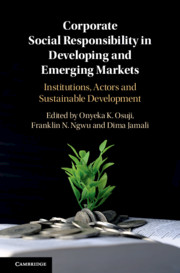 Corporate Social Responsibility in Developing and Emerging Markets
Corporate Social Responsibility in Developing and Emerging Markets Book contents
- Corporate Social Responsibility in Developing and Emerging Markets
- Corporate Social Responsibility in Developing and Emerging Markets
- Copyright page
- Dedication
- Contents
- Figures
- Tables
- Notes on Contributors
- Foreword
- Endorsement
- Preface
- Table of Cases
- Table of Legislation
- 1 Introduction to Corporate Social Responsibility in Developing and Emerging Markets: Institutions, Actors and Sustainable Development
- Part I Institutions, CSR Conceptualizations and Sustainable Development
- Part II CSR and Sustainable Development Cross-Country Studies
- 8 Firm Ownership and Corporate Social Responsibility in China: from a Multiple Stakeholder Perspective
- 9 The Dynamics of CSR, Mandatory CSR Laws, and Corporate Social Performance in India
- 10 Nigeria’s Informal Economy, Social Responsibility and Sustainable Development
- 11 The Environment in Shipping Incidents: Salvage Contracts and the Public Interest
- 12 Filling Institutional Voids in Thailand: the Case of Nestlé and the Seafood Coalition
- 13 Gender Composition of the Upper Echelons and Firm Sustainability Performance: an Examination of Istanbul Stock Exchange Companies
- Part III Normative and Utility Perspectives
- References
12 - Filling Institutional Voids in Thailand: the Case of Nestlé and the Seafood Coalition
from Part II - CSR and Sustainable Development Cross-Country Studies
Published online by Cambridge University Press: 18 December 2019
- Corporate Social Responsibility in Developing and Emerging Markets
- Corporate Social Responsibility in Developing and Emerging Markets
- Copyright page
- Dedication
- Contents
- Figures
- Tables
- Notes on Contributors
- Foreword
- Endorsement
- Preface
- Table of Cases
- Table of Legislation
- 1 Introduction to Corporate Social Responsibility in Developing and Emerging Markets: Institutions, Actors and Sustainable Development
- Part I Institutions, CSR Conceptualizations and Sustainable Development
- Part II CSR and Sustainable Development Cross-Country Studies
- 8 Firm Ownership and Corporate Social Responsibility in China: from a Multiple Stakeholder Perspective
- 9 The Dynamics of CSR, Mandatory CSR Laws, and Corporate Social Performance in India
- 10 Nigeria’s Informal Economy, Social Responsibility and Sustainable Development
- 11 The Environment in Shipping Incidents: Salvage Contracts and the Public Interest
- 12 Filling Institutional Voids in Thailand: the Case of Nestlé and the Seafood Coalition
- 13 Gender Composition of the Upper Echelons and Firm Sustainability Performance: an Examination of Istanbul Stock Exchange Companies
- Part III Normative and Utility Perspectives
- References
Summary
This chapter builds on the institutional voids literature within institutional theory by highlighting the role that multinational corporations can play when policy voids are severe, as is the case in many developing countries. We utilize an in-depth narrative case study of Nestlé’s operations in Thailand to elucidate the institutional and policy voids and then to show how Nestlé worked to fill these voids. Specifically, this chapter documents the history of slavery and child labor in Thailand and how international and domestic policy efforts have failed to address these issues in a political environment that is rife with corruption and abuse. Instead, corporations like Nestlé are filling this policy void with efforts like the Seafood Task Force, which aims to alleviate human rights abuses by eliminating them at the source.
Keywords
- Type
- Chapter
- Information
- Corporate Social Responsibility in Developing and Emerging MarketsInstitutions, Actors and Sustainable Development, pp. 232 - 257Publisher: Cambridge University PressPrint publication year: 2019
References
- 1
- Cited by
